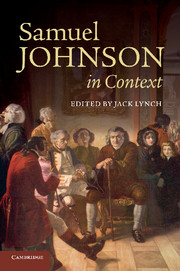Book contents
- Frontmatter
- Contents
- Illustrations
- Contributors
- Preface
- Chronology
- Abbreviations
- Part I Life and works
- Part II Critical fortunes
- Part III Contexts
- Chapter 10 America
- Chapter 11 Anglicanism
- Chapter 12 Anthropology
- Chapter 13 Authorship
- Chapter 14 Biography
- Chapter 15 Book trade
- Chapter 16 Clubs
- Chapter 17 Conversation
- Chapter 18 Dictionaries
- Chapter 19 Domestic life
- Chapter 20 Education
- Chapter 21 Empire
- Chapter 22 Essays
- Chapter 23 Fiction
- Chapter 24 History
- Chapter 25 Journalism
- Chapter 26 Law
- Chapter 27 Literary criticism
- Chapter 28 London
- Chapter 29 Medicine
- Chapter 30 Mental health
- Chapter 31 Money
- Chapter 32 Nationalism
- Chapter 33 Philosophy
- Chapter 34 Poetry
- Chapter 35 Politics
- Chapter 36 Scholarship
- Chapter 37 Science and technology
- Chapter 38 Scotland
- Chapter 39 Sermons
- Chapter 40 Shakespeare
- Chapter 41 Slavery and abolition
- Chapter 42 Social hierarchy
- Chapter 43 Theatre
- Chapter 44 Travel
- Chapter 45 Visual arts
- Chapter 46 War
- Chapter 47 Women writers
- Further reading
- Index
Chapter 32 - Nationalism
from Part III - Contexts
Published online by Cambridge University Press: 05 June 2012
- Frontmatter
- Contents
- Illustrations
- Contributors
- Preface
- Chronology
- Abbreviations
- Part I Life and works
- Part II Critical fortunes
- Part III Contexts
- Chapter 10 America
- Chapter 11 Anglicanism
- Chapter 12 Anthropology
- Chapter 13 Authorship
- Chapter 14 Biography
- Chapter 15 Book trade
- Chapter 16 Clubs
- Chapter 17 Conversation
- Chapter 18 Dictionaries
- Chapter 19 Domestic life
- Chapter 20 Education
- Chapter 21 Empire
- Chapter 22 Essays
- Chapter 23 Fiction
- Chapter 24 History
- Chapter 25 Journalism
- Chapter 26 Law
- Chapter 27 Literary criticism
- Chapter 28 London
- Chapter 29 Medicine
- Chapter 30 Mental health
- Chapter 31 Money
- Chapter 32 Nationalism
- Chapter 33 Philosophy
- Chapter 34 Poetry
- Chapter 35 Politics
- Chapter 36 Scholarship
- Chapter 37 Science and technology
- Chapter 38 Scotland
- Chapter 39 Sermons
- Chapter 40 Shakespeare
- Chapter 41 Slavery and abolition
- Chapter 42 Social hierarchy
- Chapter 43 Theatre
- Chapter 44 Travel
- Chapter 45 Visual arts
- Chapter 46 War
- Chapter 47 Women writers
- Further reading
- Index
Summary
NA′TION. n.s. [nation, Fr. natio, Latin.] A people distinguished from another people; generally by their language, original, or government.
A nation properly signifies a great number of families derived from the same blood, born in the same country, and living under the same government. Temple.
“Patriotism,” Samuel Johnson famously observed in 1775, “is the last refuge of a scoundrel” (Boswell, Life, 2:348). No wonder that this remark is among his most widely quoted one-liners: elective politics continues to provide an endless parade of con men wrapped in the sanctifying flag of one nation or another. Specialists in the British eighteenth century will recognize that “Patriotism” here refers not merely to a professed love for country as such, but to a particular brand of oppositional politics during the 1770s. In this case, however, abstracting Johnson’s quip from its original context does not badly distort his views. Although Boswell insists that Johnson’s target was “false patriotism” only (Boswell, Life, 1:424), the observation resonates tellingly with his broader engagement with the politics of nationalism. For Johnson, the politics of national self-love was an opportunity for something potentially more disturbing than the rise of a cynical politico: a mobilization of “the people” that risked shrinking universal moral horizons to the boundaries of a single nation. In resisting this nationalist tendency Johnson often embraced cosmopolitanism: though the word was not used in the eighteenth century, the notion is captured in the title of Oliver Goldsmith’s work of 1762, The Citizen of the World.
English literary culture
Johnson’s relation to nationalism is, at best, wary and ambiguous. His most notable achievements are linked to the development of a vernacular culture in eighteenth-century Britain. His most famous works are formidable contributions to English literary culture: English lexicography (A Dictionary of the English Language); the English periodical essay (the Rambler, Idler, and Adventurer essays); English scholarship (his Shakespeare edition); and the history of English literature (Lives of the Poets). Along with journalism, the novel is the genre of print culture that scholar Benedict Anderson describes as having enabled the creation of nationhood by its imagining for its readers a vast social organism – a national community – synchronized according to a shared and secular calendar. Johnson, who excelled in the new genres that print culture generated, likewise wrote a short novel, Rasselas.
- Type
- Chapter
- Information
- Samuel Johnson in Context , pp. 278 - 285Publisher: Cambridge University PressPrint publication year: 2011



